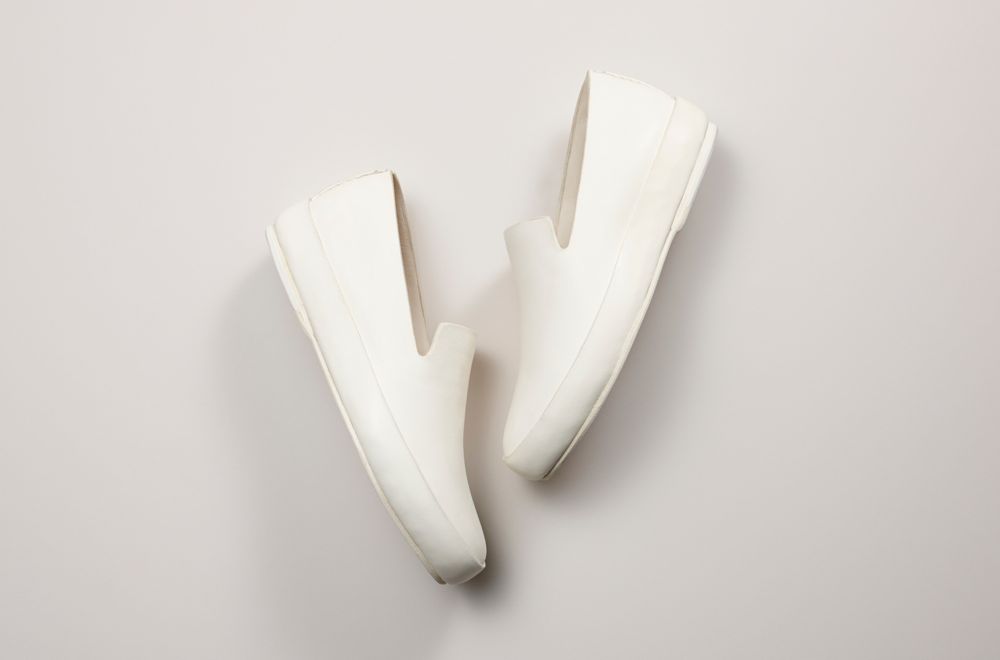Menswear Monday: Feit
There’s more to menswear than suits and ties. Every other Monday, we’re giving the fastest developing facet of fashion the attention it deserves and introducing the designers, buyers, trendsetters, and stylists you need to know.
Tull and Josh Price, the brothers behind the boutique footwear label Feit, may never have their big break. They don’t really want it. Tull already had his—in the ’90s, when he ran the cult London sneaker label Royal Elastics until it went global—and he wants his new enterprise to stay sustainably low-key. The Prices have seen to that by riffing on the same uncomplicated styles every season and only ever producing 60 pairs of each design. It’s not a high-profit model, but it is highly ethical: every shoe is handmade of entirely natural and especially durable materials. Just as importantly, their aesthetic is sustainable, too: Feit’s interpretations of the slipper, the sneaker, and the hiking boot are all so immaculately simple that they look like Platonic forms. We spotted their new vegetable-dyed, suede low-tops on Matthew Miller’s runway in London last week, and got in touch with Tull while he was visiting home in Sydney.
DESIGNER: Tull Price
BASED IN: New York
TRADEMARKS: The aesthetic of the brand is very much driven by construction first and the use of really great materials to create the design. So the designs of the product are very minimal, clean and simple—construction-driven. All of our shoes are made primarily from one piece of material, which helps to give it that very clean aesthetic. They’re all handmade and hand-sewn by one craftsman from start to finish, and they’re all made from totally biological materials. So that in itself creates a whole lot of our design. Then in terms of how it changes from season to season, it is more about building on the last collection and improving the construction.
TAKE A NUMBER: Basically, we work around the idea that we don’t want to build this into a huge company. We want to make beautiful products that are well-made and that will last. And we want to be efficient with our use of materials, so rather than making a large number of things in huge volumes at cheap prices that people wear for a little bit and replace, we’d rather make less things in smaller numbers that last a long time. I want to get out of the traditional model of chasing volume and growth, because when businesses do that, what happens in the industry is that in order to sell more stuff, they reduce the quality of the materials they use so that they can reduce the price for the consumer. And at the end of the day, you end up with a product that is made almost entirely of plastic and is pretty poorly made. We don’t want to fall into that trap. We want to build a sustainable business model, hence the limited quantities.
HELP WANTED: The limited quantity is also partly just limited by our capacity. It takes quite a while to make a pair, and there are only so many people who know the techniques that we require. It’s quite difficult to find craftsmen with the techniques to make shoes like this. There’s not a lot of new people, so that’s why it’s a slow process. There are still a few different groups and different people around the world who are still doing it, and basically I’m always traveling around trying to search out those people. There are a handful of factories in Italy making shoes in this traditional way, there’s a few in England, and there’s one in China. It’s not easy, but I think that there is a trend towards better-made products and craftsmanship. I think it’s going to continue—I think interest is building—and I think it’s encouraging some manufacturers to look into that market.
FACTORY FACTIONS: Some people say that it’s great to have all production automated and no humans involved, because humans shouldn’t be working in factories. But there’s another school of thought which feels that making shoes in a beautiful manner, as well as any other product, is a real craft—that it’s still a great thing to do, and that there are still good jobs out there for it. I lean towards that. I think these jobs are still important and they don’t need to be gotten rid of. I think the issue is only with the mass-scale production of very cheap goods, and the people who have to be involved in that is where the issue is.
BEST-KEPT SECRET: I actually don’t own that many pairs of shoes. I love shoes, and I grew up always loving different types of sneakers. But I’m one of those guys who maybe has two or three different pairs of shoes at any given time. I don’t have a huge wardrobe of them because I don’t like to be tied down by large amounts of stuff.
THE FUTURE OF FOOTWEAR: I think that the future of men’s footwear is kind of split. I think that basically you’re going to have brands that are making very beautiful, luxurious products by hand from traditional techniques and constructions that will be really beautiful and quite well-made, and they’ll be quite expensive because of the amount of human labor in the process. And then on the other side of the spectrum, you’re going to have athletic shoes that are taking real people continuously more and more out of the process, and they’re going to continue to be very cheap. I think across the board, that’s where it’s going. It’s splitting in those directions.
Menswear Monday runs every other Monday. For more, click here.







